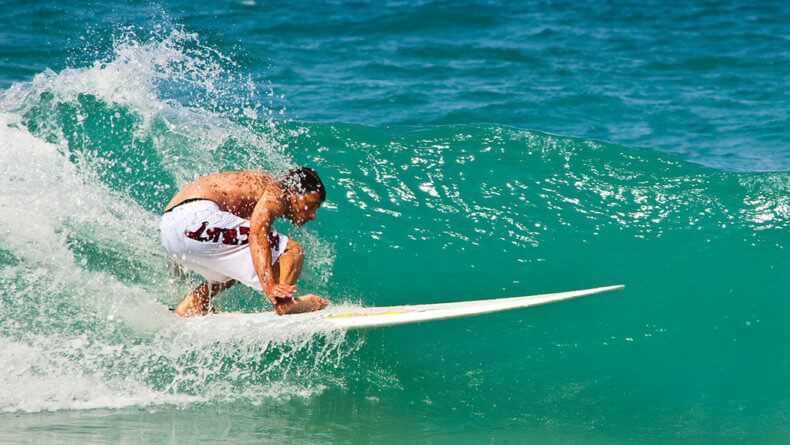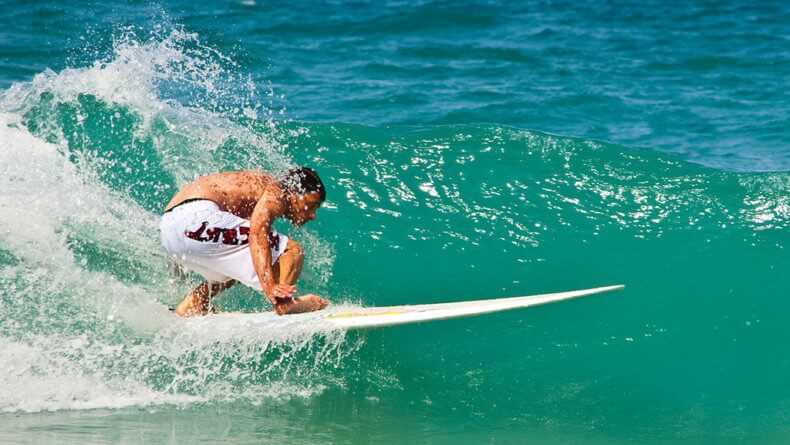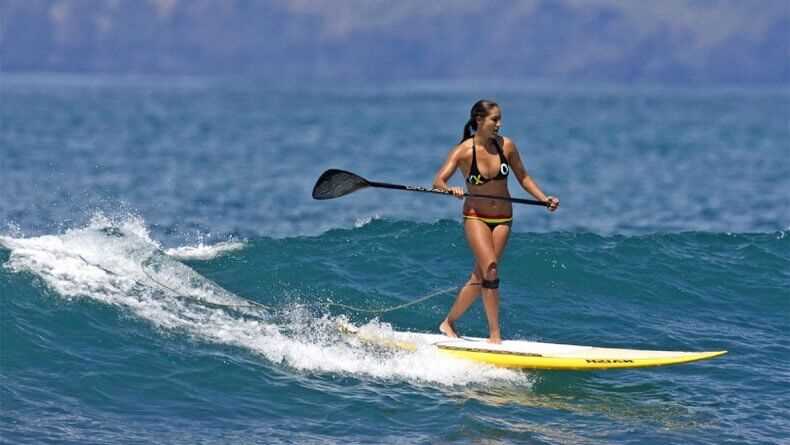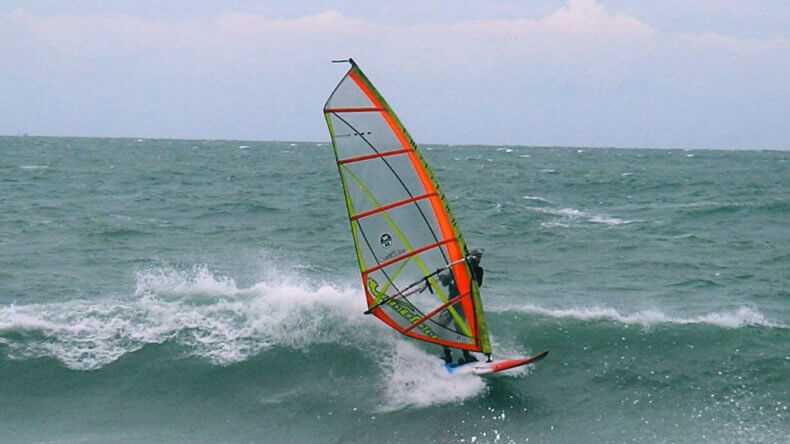Surfing in Thailand, a country bordered by warm tropical seas and with a very long coastline is a very popular beach activity. And not only among tourists but also among the indigenous population. The popularity of surfing is spurred by the fact that the best season for this sport is the period from April to October. High waves and frequent, though brief, downpours scare away all fans of leisurely relaxation on Thai beaches, so at this time of year in Thailand there is a significant decline of tourists. Prices for accommodation, food and entertainment are almost halved.
Seasons
.
Jan/Feb
Mar/Apr
May/June
July/Aug
Sen/Oct
Nov/Dec
Best season
★
★★★
★★★★
★★★
★★★
Wave height
Air temperature
32°C
35°C
33°C
32°C
31°C
30°C
Water temp
27°C
29°C
30°C
29°C
28°C
27°C
Precipitation
19 mm
50 mm
190 mm
180 mm
270 mm
55 mm
Surfing schools in Thailand are available in almost every resort town. There are three surfing areas in the country where the sport is regulated – the prices are roughly the same, the safety and the comfort. But the most widespread surfing on the waves on the boards islands, such as Phuket, Tao, Chang, Samui, Samet. In this article, we tried to place a detailed review of surf spots for fans of this kind of extreme.
Phuket
.
Surfing in Phuket is the most widespread and developed. This is due to the fact that in different parts of the island you can find the best conditions to suit the professional level of the athlete. In rainy season the height of the waves reaches about three meters and their length varies from 50 to 150 meters. According to professional surfers, this is just what is required for both safe learning and extreme riding.
Phuket beaches are good because there can be several kinds of spots within the boundaries of one. So the most popular beaches are Karon Beach and Kata Beach, where the coastline is the longest.
According to professionals, you should go here in early May. This is a time when the wind and rough sea is almost every day, so in just a week you can get a year’s worth of adrenaline and get hooked on surfing in Phuket for the rest of your life. The rest of the months can see a change in the weather and a lull in the intensity of the downpours.
Samui
.
Surfing on Koh Samui will appeal to those who don’t want the ultimate extreme, as the nature of the place itself lends itself to it. It is one of the most quiet islands in Thailand, and the sunsets on it are mesmerizingly beautiful. Its beaches are built with villas and hotels, and during the rainy season there are few tourists. The west coast of Samui is not suitable for beginner surfers, because there are most of the coral reefs. You can even see them at low tide in February.
The choppiest sea forms off the north coast, but the most popular is Chaweng beach. It’s sandy, and the beach break is the best kind of spot for beginners. The coastline is seven kilometers long, so even with the relative crowds, you can find a free spot. The spot on Lamai Beach belongs to the category of reef break, the bottom there is stony, and the high wave consistently rises in the same place, so it is more popular with advanced surfers. The best time to surf on Samui is early March or September.
Pattaya
The waves on the northern coast of the Gulf of Thailand are not at all as high and steep as those off the Malacca Peninsula, but this city also has twenty surf schools, and the range of sport stores is sure to have boards. Surfing in Pattaya focuses on Jomtien. There is also an opportunity to join kitesurfing. There are schools and a windsurf station near the Ambassador Hotel. All kinds of water activities are better from November to May in Pattaya.
Rayong
.
This is a beginner’s paradise. The waves are calm and low, it’s not scary or painful to fall. On top of that, Samet Island is surrounded by crystal clear sea. It’s quiet and peaceful, you can be secluded to the sea and ride a board without disturbing the passing boats and bathing tourists (as there are practically none here).
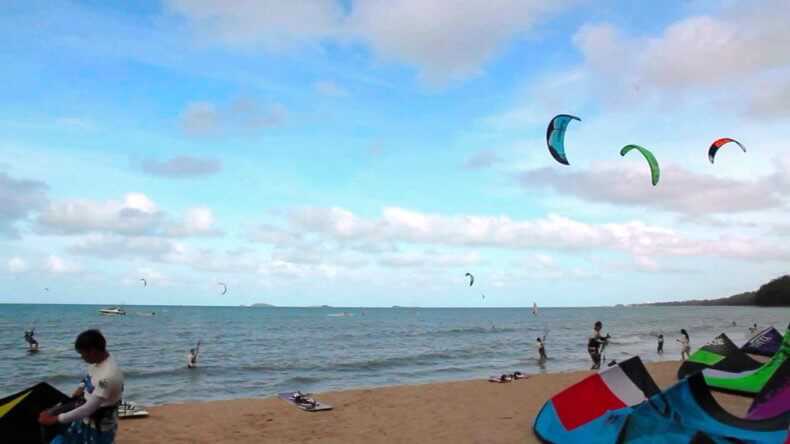
The abundance of soft waves formed by the free wind, as well as the beautiful beaches and the prospect of learning are factors that have made surfing in Thailand enjoyed by people of absolutely different levels of fitness. It is here, in addition to the typical Thai vacation, you can become a professional of the sport!
Surf spots
Quality
.
Direction
.
Type
Frequency
Experience
White Send Beach (Ko Chang)
★★★★★
Right and left
Beach break
–
All
Bang Niang Rivermouth
★★★★★
Right and left
Rivermouth
–
All
Bang Tao
★★★★
Right and left
Beach break
Experienced
Pacarang Cape
★★★★★
Right and left
Rif Coral.
—
Experienced
Chaweng Beach (Samui)
★★★★★
Right and left
Beach break
—
All
Kalim Beach (Phuket)
★★★★★
Right
Rif rock.
–
The experienced
Kamala Beach (Phuket)
★★★★★
Right and left
Beach break
–
All
Karon Beach (Phuket)
★★★★
Right
Beach break
—-
All
Kata Beach (Phuket)
★★★★★
Right and left
Beach break
–
All
Kata Noi Beach (Phuket)
★★★★
Right
Beach break
—-
Newcomers
Kao Lak
★★★★★
–
All
Ko Samet
★★★★★
Right and left
Beach break
Newcomers
Clong Dao Beach (Ko Lanta)
★★★★★
Right and left
Beach break
–
All
Haad Rin Beach (Phangan)
Right and left
Beach break
Newcomers
Ko Prayam Island
★★★★★
Right and left
Beach break
–
All
Ko Yai Mak Island
★★★★
Right and left
Rif rock.
The Experienced
Le Meridien (Phuket)
★★★★
Right
.
Ref Coral.
–
Experienced
Laem Sing Beach (Phuket)
★★★★★
Left
Sand-bar
—-
All
Pansea Beach (Phuket)
★★★★
Left
Point break
–
Experienced
Patong Beach (Phuket)
★★★★
Right and left
Beach break
—
Newcomers
Rampueng Beach (Rayong)
★★★★★
Right and left
Beach break
–
All
Surin Beach (Phuket)
★★★★★
Right and left
Beach break
—
All
Some surf spots on a map of Thailand
.
Use the arrow keys to navigate.
Cartographic data © 2022 Images ©2022 NASA
Map Data © 2022 Images ©2022 NASA
Use the arrow keys to navigate.
Map Data ©2022 Google Images ©2022 TerraMetrics
Map Data ©2022 Google Images ©2022 TerraMetrics
Read More:- The weather, beaches, prices in Phuket in spring – in March, April, May.
- Weather, beaches, prices in Phuket in summer – June, July, August.
- Ko Lipa Island is a true paradise on the edge of Thailand..
- Surin Beach is a millionaires' beach in Phuket.
- 10 Phuket hotels for holidays with children, their advantages and disadvantages.
- When it's rainy season or when it's better to go to Thailand.

